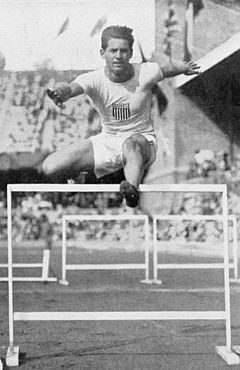Fred Kelly (hurdler)
 Fred Kelly at the 1912 Olympics | ||||||||||||
| Personal information | ||||||||||||
|---|---|---|---|---|---|---|---|---|---|---|---|---|
| Born | September 12, 1891 Beaumont, California, United States | |||||||||||
| Died | May 7, 1974 (aged 82) Medford, Oregon, United States | |||||||||||
| Height | 1.82 m (6 ft 0 in) | |||||||||||
| Weight | 72 kg (159 lb) | |||||||||||
| Sport | ||||||||||||
| Sport | Hurdle running | |||||||||||
| Club | USC Trojans, Los Angeles | |||||||||||
Medal record
| ||||||||||||
Frederick Warren Kelly (September 12, 1891 – May 7, 1974) was an American athlete, winner of 110 m hurdles at the 1912 Summer Olympics.[1]
Born in Beaumont, California, Fred Kelly attended Orange High School and was a freshman at University of Southern California, when he was selected to US 1912 Olympic team.
At Stockholm, Kelly won his preliminary heats easily and qualified to the final with four more Americans and one representative from Great Britain. From the start, the five Americans ran even until the eighth hurdle, where Kelly and James Wendell spun ahead to decide the winner. Kelly got in front the instant before the tape was broken, to win by 0.1 seconds. He also competed for USA in exhibition baseball tournament in Stockholm.
Kelly was the AAU Champion in 120 yd (110 m) hurdles in 1913 and finished second in 1916 and 1919. Kelly also finished first at the 1915 AAU Championships, but was disqualified for knocking down four hurdles.
Kelly served in the United States Army in World War I and later became a pioneering aviator, carrying mail for Western Air Express and training Army pilots during World War II.[2]
He served as the first President of the SoCal Olympians and Paralympians, beginning on March 19, 1949.
Fred Kelly died in Medford, Oregon, aged 82.
A stadium near where he attended Orange High School in Orange, California has been named after him, Fred Kelly Stadium, which is located next to El Modena High School.
See also
[edit]References
[edit]- ^ "Fred Kelly". Olympedia. Retrieved 22 April 2021.
- ^ "Fred Kelly Aviation Pioneer And Olympic Medal Winner". The New York Times. UPI. 9 May 1974. Page 46, column 1. Retrieved 28 September 2023.
External links
[edit]- Evans, Hilary; Gjerde, Arild; Heijmans, Jeroen; Mallon, Bill; et al. "Fred Kelly". Olympics at Sports-Reference.com. Sports Reference LLC. Archived from the original on 2012-10-24.
- 1891 births
- 1974 deaths
- American male hurdlers
- Athletes (track and field) at the 1912 Summer Olympics
- American aviation pioneers
- Aviators from California
- Baseball players at the 1912 Summer Olympics
- Baseball players from Orange, California
- Medalists at the 1912 Summer Olympics
- Olympic gold medalists for the United States in track and field
- Orange High School (Orange, California) alumni
- Track and field athletes from California
- United States Army personnel of World War I
- USC Trojans men's track and field athletes
